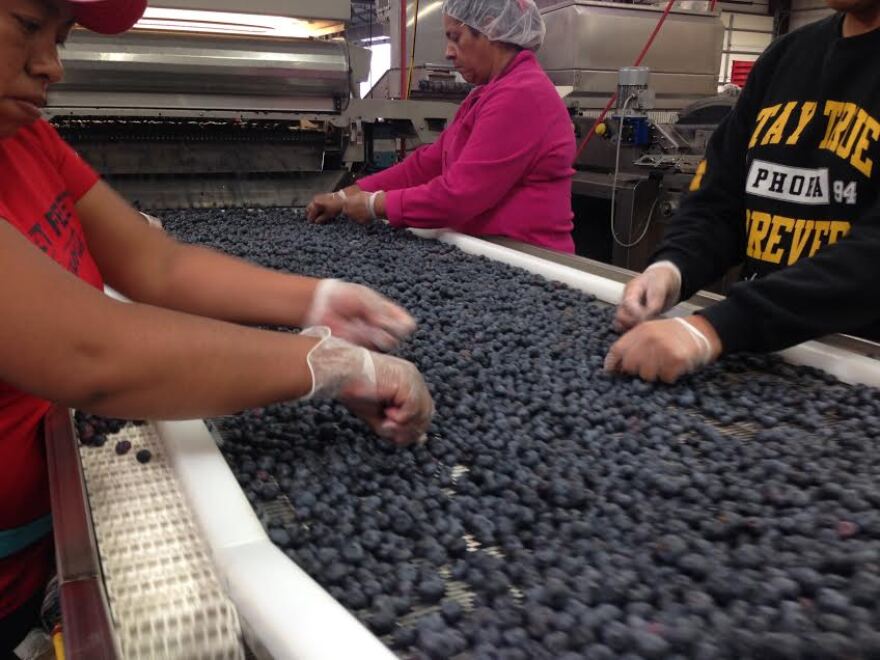At the Ivanhoe Blueberry Farms in Sampson County, many of the blueberry bushes are close to eight feet tall now, with plants so close, visitors can hardly see from one row to another.
The farm's co-owner Neal Moore says his family has been in the business for four generations since the 1940s.
"They started with five acres of blueberries, and now we have grown the farm, my brother and I, Willie Moore, to about 600 acres of blueberries," Neal Moore said.
Area grocery stores are full of blueberries these days, and if you look closely, the labels will show many were grown and packaged in North Carolina. It's a $58.2 million industry in the state.
The state is a top ten producer of blueberries and this year's crop is a good one. Most of the high-bush blueberries have been harvested and a later variety will be picked into August. Almost all of the blueberries in North Carolina come from only a few counties where the salt and pepper soil reigns supreme.

A century of domesticated blueberries in the U.S.
The first commercial blueberry harvest was in New Jersey in 1916. Moore says by the 1930s, it was discovered that North Carolina had the perfect salt and pepper acidic soil to also grow the new berry. A well-managed blueberry crop, he said, can bring in 10 to 15,000 pounds of blueberries an acre.
"In the old days it was considered kind of a wasteland," said Moore. "But when the domestication of blueberries occurred and people were looking for earlier market, North Carolina became a prime growing place for blueberry."
Moore said the only other thing that will grow in this soil are pine trees.
Blueberry packaging
A few feet from Moore’s office is the packaging facility. That's where as many as 50 workers clean and sort the blueberries on a recent day. Large machines weigh and pour blueberries into two pound containers before they’re sent to a commercial cooler.
"And [we] cool them to 34 degrees and load them onto 18-wheeler trucks and they go out to all parts of the eastern US and Canada," said Moore.
About 25 percent of these blueberries will be frozen, but the majority will be sold fresh. Moore said his blueberries are usually good for 10 to 14 days on the grocery store shelf. Right now in stores there are a lot of blueberries from Blueberry Hill, Cottle Farms, Naturipe and American Blueberries, all from North Carolina.

A family affair
Reva Upright is Moore's aunt. She's spent many years at Ivanhoe Blueberry Farms. Upright said when she was younger, and helping out at the farm, you couldn't get her to eat blueberries.
"The variety then was an old time variety and to me it had no taste whatsoever, just very bland," said Upright. "But now with all the different varieties, you get sweet, you get tart, you get crunchy, you get soft."
Upright has her favorite varieties and her not-so-favorite varieties, especially when she's baking her popular blueberry sour cream cakes. They always sell out at the annual Blueberry Festival in Burgaw.
"New Hanover will just burst in the cake and it's just blue," said Upright, with a big smile. "Then you have a variety like Legacy or Reveille, they hold their shape pretty much especially Reveille and that makes a great pie."
Blueberry fans across the state
There is no official store at Ivanhoe Blueberry Farms, but that doesn't stop people from just stopping by to pick up a pound or two while the pickin's good.
"I'm from Sampson County, and I've known these people for a long time," said Selma Turlington, while counting out her pints of blueberries.
Turlington drove 45 minutes from Clinton to come and get blueberries for her family and friends. She bought dozens of pints of blueberries.
"I like to put them in the freezer so I can have them in the wintertime and just eat them fresh. They're just wonderful. And they’re great antioxidants," said Turlington.
And it doesn't hurt blueberries are considered by many as the world's healthiest food – helping with everything from boosting brain power to curbing heart disease.
That's all well and good. But if you ask a blueberry farmer what tops their list of prayers – it’s for no more warm winters and spring freezes. The blueberries don’t like that.











